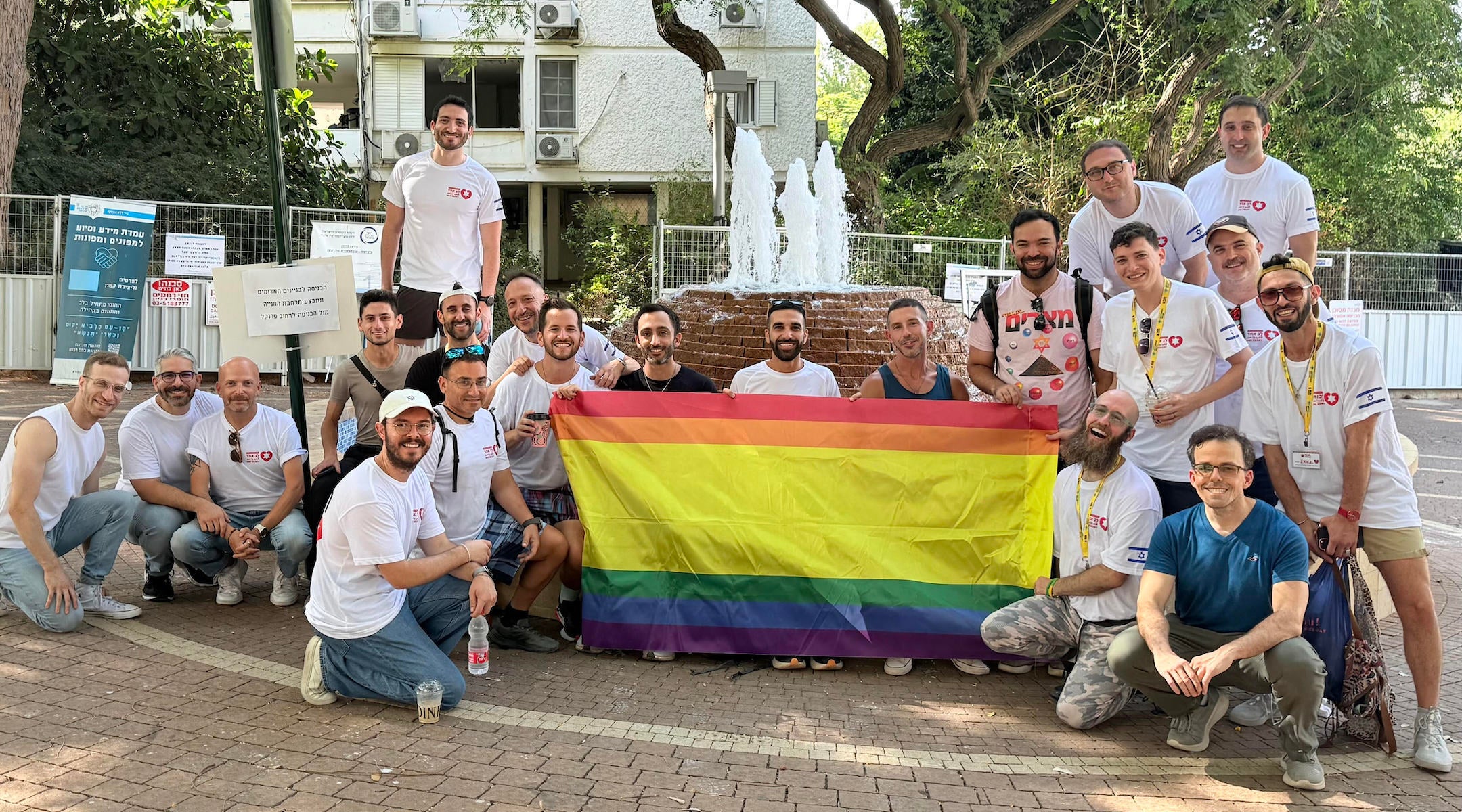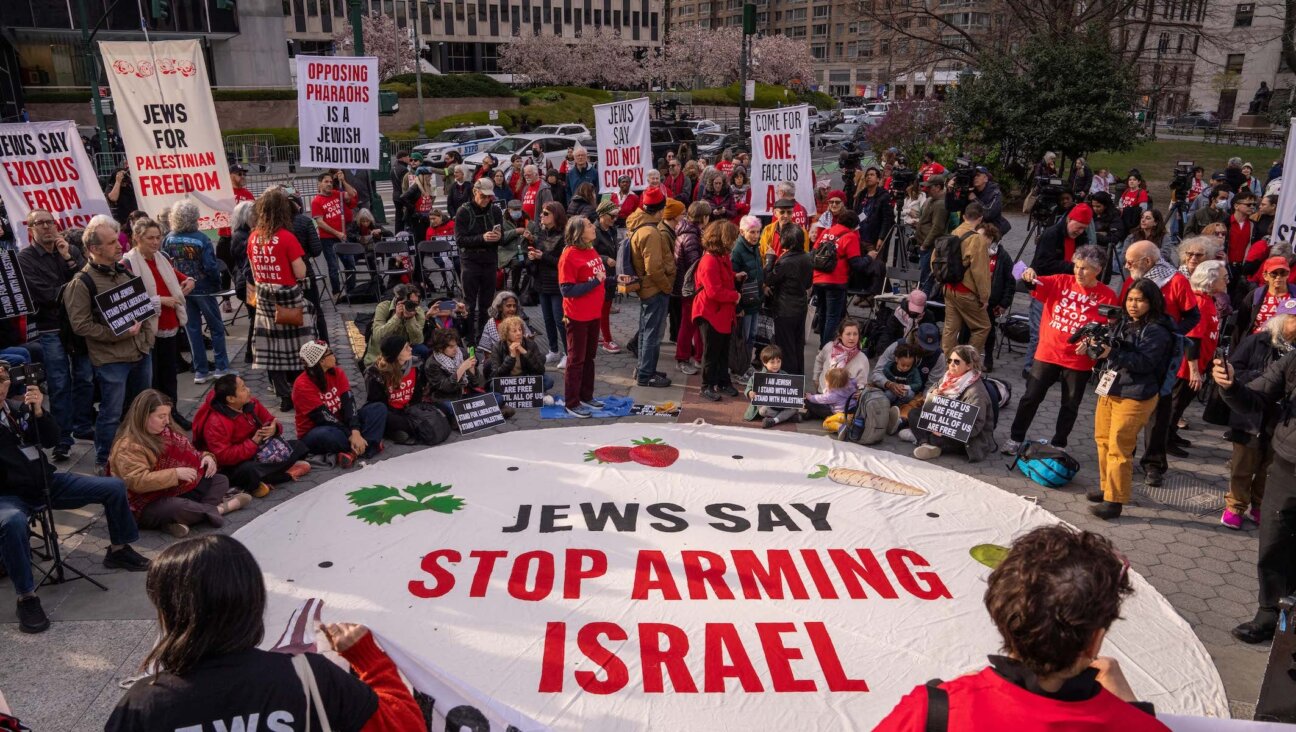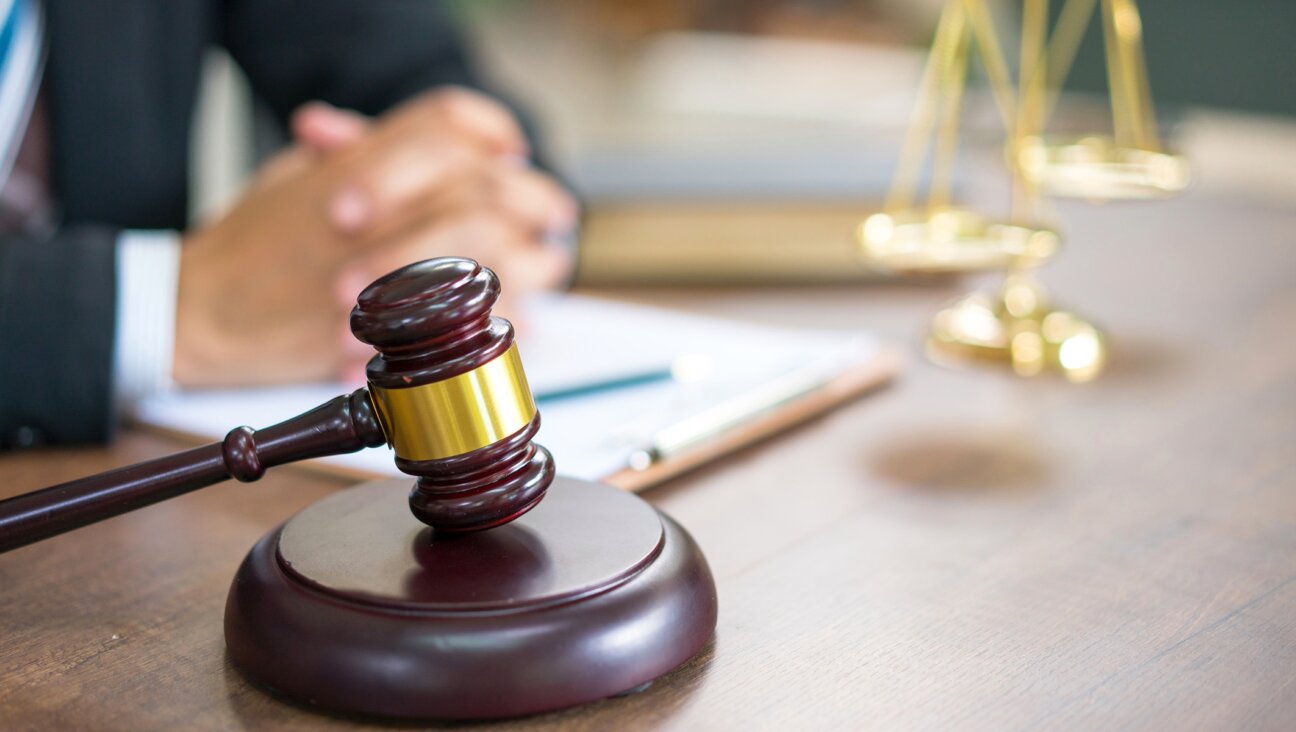Sidelined at Pride celebrations, pro-Israel LGBTQ Jews find breathing room in Tel Aviv
Anti-Israel sentiment in queer communities can feel like ‘being forced back into the closet,’ said the leader of a recent delegation from the United States

A group from a delegation organized by Hebro and Birthright Israel pose after clearing out an apartment damaged by an Iranian ballistic missile in Ramat Aviv, Israel, in August 2025. Photo by Gali Gordon
(JTA) — TEL AVIV — Under the haze of neon lights and techno beats, Roni Tessler waited for legendary DJ Offra to begin his set in a Tel Aviv club. Minutes later, the music cut and the party was shut down. Israel had launched a wave of airstrikes on Iran, pummeling nuclear sites and triggering a 12-day war that would trap Tessler and nearly a hundred other North American LGBTQ Jews in the country.
Organized by the Jewish Federations of North America, the trip included 15 first-time visitors to Israel and came amid a broader sense of alienation many had been feeling in their LGBTQ communities back home. Tessler, originally from Potomac, Maryland but living on Manhattan’s Upper West Side for the past 15 years, compared being in Israel to Fire Island “as a place where gay people can breathe.”
Israel, he said, offered the same attraction, but doubly.
“Israel also feels like a place where I can breathe, but as a Jew,” he said. “Seeing Israeli flags everywhere and Jewish stars and knowing the people around me don’t hate me.”
After the initial strikes, flights were suspended. In the ensuing days, most of the delegation fled the country by other means — including by boat or through Jordan — where they were told to hide their Jewish symbols. For those who had come seeking the safety of being visibly Jewish, the reversal was hard to ignore.
The trip was intended to be bookended by the Jerusalem Pride parade at the beginning and Tel Aviv’s storied counterpart on June 13, but with the war breaking out the night before, that parade was called off.
Still, the group pressed on with their itinerary. Ultimately, several members took advantage of flight interruptions to extend their stay, while others returned this month on a second major delegation of LGBTQ Jews, drawn by the massive reorientation in their identities induced by the fallout from Hamas’ Oct. 7, 2023, attack on Israel.
“A lot of our folks identified as gay first, and then as American or Jewish, but now the Jewish part of our identity has kind of moved to the top, because we’ve been forced to,” said Jayson Littman, who helms Hebro, a group for gay Jews in New York that worked with Birthright Israel on the second trip. He said interviews with trip applicants revealed that many described themselves as “closeted again” as Jews in their gay communities.
Nate Looney, JFNA’s director of community safety and belonging who organized the June mission in just nine weeks, said interest had surged after a year marked by antisemitic hostility at Pride events across the United States. Looney, who lives in Washington, D.C., and identifies as trans, recalled a glass bottle being thrown at his group during last year’s Pride parade and described growing efforts by organizers in multiple cities to exclude Jewish or pro-Israel contingents entirely.
“I never thought there would be violence coming from within, directed at me only for being a Jew. You could show up and be fully queer, but just don’t show up and be fully Jewish,” he said, adding, “Jews were being forced back into the closet.”
In the months since, Pride events around the world have been marred by clashes over Israel, including when organizers have sought to exclude Jewish LGBTQ groups. In Ottawa, Canada, the parade was canceled after pro-Palestinian protesters blocked the route. Montreal’s parade banned two Jewish groups from participating before reinstating them under pressure. Jewish groups pulled out of the events in San Diego, citing safety concerns and an anti-Israel headlining act.
In Rome, the Jewish LGBTQ group Keshet Europe hired private security in anticipation of possible disruptions, after skipping the parade last year entirely out of safety concerns. The parade was a distressing experience for those who participated, Ruben Piperno, one of the organizers, told JTA at the time.
“We were subjected to insults, jeers, and serious accusations, with some individuals following us throughout the entire parade, challenging our queer identity, and accusing us of ‘pinkwashing’ on behalf of the Israeli government,” said Piperno, who is 31 and lives in Turin.
On the JFNA trip, many of the delegates said the rupture with their communities had been sudden and isolating. Eshel, an Orthodox LGBTQ nonprofit, and A Wider Bridge, a pro-Israel LGBTQ group, surveyed hundreds of LGBTQ Jews. Among those who “strongly present as Jewish” — with visible Jewish clothing or symbols, 67% reported experiencing antisemitism since the start of the Israel-Hamas war. A majority of respondents also said they were withdrawing from queer spaces or concealing their Jewish identity in order to remain in them.
Ashley Kravetsky, a nurse and drag performer from Edmonton, Canada, said the backlash she encountered pushed her out of a community she had long seen as a refuge.
“I was very surprised that people were not able to recognize that what they were saying was harmful to me as a Jewish person,” she said. “I was seeing people post about inclusion and equity and how we have to love and hold space for marginalized communities and in the same breath saying ‘free Palestine’ and ‘Jews are colonizers’ and ‘no Zionists allowed,’ without even conversations allowed to take place. I can count on one hand how many people were willing to have a conversation with me.”
“It was no longer safe for me to be in the queer community — and that included threats of physical violence,” she added.
For Orthodox LGBTQ Jews, there were even fewer options. Eshel co-founder and director Miryam Kabakov, who joined the delegation, said her community was being forced out of one space without being able to enter another.
“A very large percentage are leaving LGBT spaces to be in Jewish spaces. But in our case, they’re also Orthodox, and that’s not an alternative — they can’t really go to Orthodox spaces. So where do they go?” Her organization has since received funding from UJA to begin building what she called a “third space.”
For Bobby Apperson, who relocated from San Francisco to New York in search of a larger LGBTQ Jewish community, the trip to Israel was his first. Before leaving, he had watched a social space he had frequented in San Francisco come under repeated attack. Manny’s, a Mission District café owned by civic advocate and queer Zionist Manny Yekutiel, had its windows smashed and graffiti scrawled across the walls. Messages read: “Fuck Manny,” “Zionist Fucks Gentrifyers,” [sic] and “The only good settler is a dead 1.”
“It was all very Kristallnacht,” Apperson said. “It’s not just queers but the progressive movement overall. They think they’re fighting for Palestinians, when actually they’re doing the complete opposite — embracing intifada and global jihad and undermining safety, including for themselves.”
In Israel, he said, the tone was different. “Not one person we met was calling for violence of any kind against Palestinians. Here the queer community is fighting for peace — for the entire queer community, including Palestinians. It’s not splintered.”
Looney said the mission intentionally foregrounded complexity rather than presenting Israel as a sanitized success story, and some of the group’s encounters challenged assumptions. A panel of LGBTQ IDF reservists included two trans soldiers and offered what one participant described as “more ideological diversity than I ever heard in the States.” One trans reservist, Ma’ayan Gross — who is currently serving with her original all-male combat unit in Gaza — told the group she supported continued military operations there, even at the risk of killing Israeli hostages — a position held by only a small minority of Israelis. Others still expressed unease or disapproval of the war.
“I’ve heard queer people here saying things that sound like what the far-left anti-Zionist movement says in the U.S., like wondering if the military has gone too far,” Apperson said.
In Jerusalem, the group attended the Pride parade, which commemorated 10 years since the murder of 16-year-old marcher Shira Banki. Apperson described the heavy security presence — ostensibly to prevent anti-LGBTQ violence — as jarring.
“It was to protect Jews from other Jews. Even in Jerusalem, you have to choose between your queerness and your Judaism,” he said.
“But it’s an inversion. In America, queer people are looking at all Jews as suspicious — it’s classic antisemitism,” he added. “And here, queer people are being looked at with suspicion by, you could say, the most Zionist people.”
For Chaim Levin, a New Yorker and anti–conversion therapy advocate who once studied in a Jerusalem yeshiva, the sight of communist flags at the march — likely from supporters of the far-left Israeli Communist Maki Party — was a reminder of how disorienting Israel can be. His grandparents fled Soviet Russia to Israel in 1948, he said, and seeing that symbol in the streets of Jerusalem was hard to stomach.
“It was really shocking,” he said. “But also, I take solace in the fact that there’s free speech and they can do that here.”
Over six days, participants visited kibbutzim devastated in the Oct. 7 attacks, met with survivors of the Nova festival massacre and representatives from the Hostages and Missing Families Forum, spoke with LGBT representatives from communities as diverse as Haredi and Arab, and sat down with President Isaac Herzog.
Yoanna Chaya Kollin, a trans delegate from Los Angeles, said, “Herzog turned to me and said, ‘All transgender people will be welcome here always.’ I know it’s not the same, but Donald Trump would never do that for me in a million years. It made me feel seen.”
A visit to the Western Wall’s egalitarian section proved especially meaningful for several in the group, particularly those who were still observant or had once been. A handful posed with a rainbow flag bearing a Star of David — a moment that marked a turning point for Jeremy Nagel, from Los Angeles, who had studied in yeshiva two decades earlier.
“In the past, I had always gone to the Kotel to pray the gay away,” he said. “This is the first time I didn’t do that. I never thought then that I’d be back in this capacity, as a proud gay Jew.”
Dillon Perez, from New York, said he had arrived expecting to focus on personal healing, but standing at the Western Wall, his thoughts turned outward. “I came to reconnect to Israel for myself, and maybe to meet a cute guy. But the prayers that mattered the most had nothing to do with me. At the Kotel I kept saying, ‘Hashem, keep Israel safe.’”
The trip was also meant to be a two-way exchange, Looney said, offering solidarity to LGBTQ Israelis navigating war and exposing them to the intensity of diaspora antisemitism. Several Israeli speakers said they had never experienced antisemitism at that scale and were struck by its impact on their North American peers.
“We’re all faced with the decision about whether we’re a minority of Jews within the LGBT community or a minority of LGBT in the Jewish community,” said Hen Mazzig, an Israeli activist who divides his time between Tel Aviv and London, where he lives with his non-Jewish partner. “Each of those comes with different challenges. So it’s great to be in a space where we can be both.”
Omer Ohana, the first gay man formally recognized as an IDF widower after losing his fiancé Sagi Golan on Oct 7, led a session that left many in tears. Meeting Diaspora Jews, he said, gave him the energy to keep going. But it wasn’t just emotional support; every dollar behind advancing the same-sex widower legislation came from U.S. donors, he said.
Even after Iran began targeting Israel with devastating missile barrages, the online backlash didn’t stop. After posting on Instagram about the surreal shift from dancing at a Lady Gaga event one minute and running for a bomb shelter the next, Levin said an acquaintance unfollowed and blocked him.
“That was just another confirmation for me,” he said, of someone else who had “bought into this dynamic that Israel — bad, everyone else — good.
“Obviously, that’s not true. I hope one day they’ll see that but I don’t have a lot of hope.”
Tessler, along with a few others including Nagel, stayed in Israel for the duration of the war before going on to Europe and the United States. Two weeks after the canceled Offra set, he was back at the rescheduled event, posing again with Nagel in the same spot where they had stood just before everything changed.
“This is how Israel has functioned since its inception,” he said. “You get the feeling that there’s no sense of victimhood here — we’ll protect ourselves, but we’re still going to live, and we’re going to live life to the fullest. It was very special to be a part of that.”
Tessler returned to Israel this month to lead the Hebro-Birthright volunteering mission for 160 LGBTQ Jews from 15 countries. Like the JFNA delegation, it was organized at the last minute in part to create a safe space for queer Jews.
Like the many other volunteering trips that Birthright has organized for adults, the Hebro trip itinerary includes stints at food pantries, army bases and communities damaged by war. But the Israelis joining the group all come from the local LBGTQ community, and Littman said the group found its own resonance in visiting the site of the Nova music festival massacre.
“Seeing that that sort of safe space was broken, we definitely kind of connect to that,” said Littman, who is on the board of a New York City synagogue where about 40% of members died in the AIDS epidemic in the 1980s. “And we know what it means to insist on something that’s joyful even after pain.”
Simone Somekh contributed reporting.
















